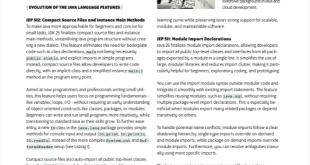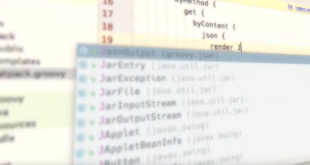We’re proud to announce that during the first edition of MLCon Amsterdam (April 20–24), we …
Read More »VibeCoding – the buzzword in our community in 2026. It’s time to dive in!
We’re proud to announce that during the first edition of MLCon Amsterdam (April 20–24), we will also…
PartnerNews: Vaadin Launches Swing Modernization Toolkit, Enabling Java Teams to Run Desktop Applications in the Browser
New solution provides incremental path from Java Swing to modern web applications while preserving e…
Some great J-Spring news
Following the tremendous success of the last edition, the board decided that J-Spring can be even bi…
J-Fall 2025: A Day to Remember
On November 6, 2025, the Java community came together in Ede for another great edition of J-Fall. Th…
Devopscon & MlCon 2026
We are proud to inform you about the arrival of 2 international conferences taking place in Amsterda…
-
An Exploration of Cutting-Edge Updates – Ana-Maria Mihalceanu
Lees hier het artikel “An Exploration of Cutting-Edge Updates” van Ana-Maria Mihalceanu.
Read More » -
Java Magazine 4
-
Java Magazine 3 is uit
-
JAVA MAGAZINE 2 – 2025
-
JAVA MAGAZINE 1 – 2025
Java Articles by Foojay.io
February, 2026
-
28 February
JavaFX Links of February 2026
Author: Frank Delporte Original post on Foojay: Read More Table of Contents ApplicationsComponents, Libraries, ToolsPodcasts, Videos, BooksTutorialsMiscellaneousJFX Central Here are the JavaFX LinksOfTheMonth of February 2026. You can find the weekly lists on jfx-central.com. Did we miss anything? Is there anything you want to have included in one of the next overviews? Let us know via links@jfx-central.com. Applications Amazing work …
Read More » -
27 February
How to Build a Search Service in Java with MongoDB
Author: Erik Hatcher Original post on Foojay: Read More Table of Contents PrerequisitesSearch service designSearch service interface Returned results Search service implementation GETting the search results Aggregation pipeline behind the scenes $search in code Field projection Aggregating and responding Taking it to productionFuture roadmapConclusion We need to code our way from the search box to our search index. Performing a …
Read More » -
27 February
Gotta Code ‘Em All: How Java Evolved Beyond Verbosity – Celebrating 30 Years of Pokémon
Author: Igor De Souza Original post on Foojay: Read More Table of Contents Java 25 – Compact Source Files and Instance Main Methods (JEP 512) Java 25 – Flexible Constructor Bodies (JEP 513) 30 Years of Pokémon. Decades of Java Evolution. LinksLinks Happy 30th Anniversary to Pokémon! 🎉 February 27, 2026 marks exactly 30 years since the original Pokémon Red …
Read More » -
26 February
Cipher Downgrade: How a Tomcat Update Could Weaken Your TLS Configuration
Author: Joe Kuhel Original post on Foojay: Read More Table of Contents What’s the risk?Who is AffectedThe Fix How to Verify Recommendation A recent update to Apache Tomcat introduced a subtle but significant change to how TLS cipher suites are configured. If your Spring Boot application explicitly configures TLS ciphers, particularly TLSv1.3 ciphers, and runs on Tomcat 9.0.115+ (Spring Boot …
Read More » -
26 February
Translating a Website into 8 Languages with AI Agents in One Night
Author: Bruno Borges Original post on Foojay: Read More Table of Contents How I used Claude Sonnet 4.6 and fleets of GitHub Copilot Coding Agents to internationalize java.evolved — from spec to deploymentThe Architecture Decision: Let the AI Draft the SpecPhase 1: Building the InfrastructurePhase 2: The First Translations (Spanish + Portuguese)Phase 3: The Fleet — 6 Languages in Parallel …
Read More » -
26 February
Watch the Recording: DIY Technical Marketing for Java Developers
Author: Dominika Tasarz Original post on Foojay: Read More The software development industry is more competitive than ever. Being a strong technical expert is essential, but on its own it is often not enough to grow your career or open new opportunities. In this short, practical talk DIY Technical Marketing, Real World Tips For Building A Successful Developer Brand, delivered …
Read More » -
25 February
I Got Java 25 Running on the RISC-V BeagleBoard BeagleV-Fire
Author: Frank Delporte Original post on Foojay: Read More Table of Contents The ChallengeThe Solution: BeagleBoard Imaging Utility Serial Connection Setup Failed With macOS Succeeded With Linux Installing Java 25What’s Next: Performance TestingConclusion After my initial struggles with the BeagleV-Fire in a previous video, I succeeded in getting Java 25 running on RISC-V-powered BeagleV-Fire! Let me walk you through the …
Read More » -
24 February
MongoDB and the Raft Algorithm
Author: Elie Hannouch Original post on Foojay: Read More Table of Contents Raft Roles and MongoDB’s Replica Set Log Replication: Ensuring Consistency Commitment and Durability in MongoDB Failure Handling and Recovery MongoDB-Specific Optimizations in Raft Consistency Levels with Raft Raft vs. Paxos: Why Chose Raft Conclusion MongoDB’s replica set architecture uses distributed consensus to ensure consistency, availability, and fault tolerance …
Read More » -
23 February
From “Crypto AI” to general AI: Do AI agents dream of electric langoustines?
Author: Michal Maléř Original post on Foojay: Read More Table of Contents The shift that matters for agent commerce – From “Crypto AI” to general AIWhat changed in x402 and ERC-8004 in the last month or so?This is the moment that unlocked agent commerceWhat is still missing?What does the stack look like in practice?Who is Langoustine69, and why is this …
Read More » -
23 February
Announcing Cloud-Native BoxLang for $5/Month
Author: Cristobal Escobar Original post on Foojay: Read More Table of Contents Cloud-Native BoxLang Has Never Been Easier Production-Ready for $5/Month Who Is This For? What You Get Out of the Box Deploy in 3 Clicks Grow Beyond the Basics Why BoxLang + DigitalOcean? Get Started Today Ready to Deploy? TL;DR: We just released a production-ready starter template that deploys …
Read More »
 NLJUG – Nederlandse Java User Group NLJUG – de Nederlandse Java User Group – is opgericht in 2003. De NLJUG verenigt software ontwikkelaars, architecten, ICT managers, studenten, new media developers en haar businesspartners met algemene interesse in alle aspecten van Java Technology.
NLJUG – Nederlandse Java User Group NLJUG – de Nederlandse Java User Group – is opgericht in 2003. De NLJUG verenigt software ontwikkelaars, architecten, ICT managers, studenten, new media developers en haar businesspartners met algemene interesse in alle aspecten van Java Technology.











